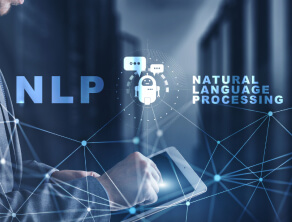Blockchain in Healthcare: Revolutionizing the Future of Medical Technology.

The healthcare industry is constantly evolving, with new technologies and innovations driving significant advancements in patient care. One such technology that has gained considerable attention is blockchain. Blockchain can revolutionize healthcare by improving security, privacy, and accessibility while placing patients at the center of all operations. In this article, we will explore the concept of blockchain, its application in the medical industry, and the companies leading the way in this transformative field.
Understanding Blockchain: A Game-Changing Technology
Blockchain is a distributed system that generates and stores data records in a digital ledger. It consists of interconnected “blocks” of information shared, changed, or accessed on a peer-to-peer network. Each device on the blockchain system generates identical blocks, ensuring data parity and easy identification of changes. This decentralized approach, coupled with hashing, creates an immutable and secure chain of blocks.
Hashing assigns a unique identifier to each block based on its contents. Any alterations to the data within a block would result in a change in its hash. As blocks are stored in chronological order and reference the preceding block’s hash, attempting to manipulate the data of one block would be immediately detected by subsequent blocks. This ensures the integrity and reliability of the information stored in the blockchain.
Blockchain’s Impact on the Medical Industry
The healthcare industry faces numerous challenges, including the secure sharing and access of sensitive patient data. Blockchain technology provides a solution by enabling finely customizable openness while maintaining the highest security standards. Let’s explore how blockchain is transforming the medical industry through the innovations of pioneering companies.
Chronicled: Facilitating Interoperability and Collaboration
Chronicled, a company utilizing blockchain technology through its MediLedger Network, aims to bring trading partners and medical institutions closer together. By ensuring secure and seamless communication, blockchain allows for more significant innovation, accountability, and industry development. Automation of processes and improved trust among all parties involved are just a few benefits that Chronicled’s blockchain solution provides.
Curisium: Streamlining Contract Management
Curisium, acquired by HealthVerity in 2020, employs blockchain to streamline rebate negotiation and contract management. The complexity and time-consuming nature of contract negotiations in healthcare can be alleviated through Curisium’s platform. This innovative solution enables providers and payers to engage in efficient and secure contracting arrangements, paving the way for collaboration and cost savings.
Ever: Transforming Thailand’s Medical Landscape
Ever, a revolutionary company founded in 2017, has modernized Thailand’s medical landscape through its blockchain-based EHR solution. With over 170 hospitals and 5 million patients connected, Ever’s network ensures secured and trustless data exchanges, extensive data collection and analysis, and machine learning and artificial intelligence utilization. By placing a strong emphasis on security and communication, Ever has created a flexible and scalable blockchain foundation for the future of healthcare.
Patientory: Empowering Patients with Data Control
Patientory leverages blockchain’s transparency and privacy features to develop patient-centric applications and services. By securely storing and sharing up-to-date patient histories and data, Patientory gives individuals more control over their well-being. The company’s innovative solutions include pandemic tracking, secure communication with healthcare professionals, and real-time access to verified healthcare information.

The Promising Future of Blockchain in Healthcare
Blockchain technology’s potential to revolutionize healthcare is immense. According to BIS Research, Its implementation can save the industry over $100 billion annually by 2025. As the healthcare sector embraces blockchain, the possibilities for growth and innovation are endless.
Companies like Chronicled, Curisium, Ever, and Patientory are just the beginning of a blockchain revolution in healthcare. By adopting this technology, the industry can enhance security, streamline processes, and improve patient outcomes.
The Growing Blockchain in Healthcare Market
The blockchain in the healthcare market is poised for significant growth, with a forecasted market size of USD 19.52 billion by 2028, representing a CAGR of 52.48% from 2023 to 2028. North America stands as the fastest-growing and most significant market in this sector, driven by regulatory requirements, the need for enhanced security, and rising healthcare costs.
Major Players Driving the Market
Several major players are leading the blockchain revolution in the healthcare market, including IBM Corporation, Microsoft Corporation, Patientory Inc., Guardtime Federal, and Hashed Health. These companies leverage blockchain technology to develop cutting-edge solutions that address the industry’s challenges and drive innovation.
Segmentation and Application of Blockchain in Healthcare
Blockchain technology can transform healthcare aspects, including clinical data exchange, billing management, claims adjudication, and supply chain management. By bringing transparency and efficiency to these complex transactions, blockchain enhances collaboration between stakeholders and ensures the integrity of health-related data.
Market Trends and Opportunities
Counterfeit proofing and data protection are key market trends in the blockchain in the healthcare industry. Blockchain’s ability to secure and share health data effectively addresses the increasing problem of counterfeit medicines. By sharing information across the blockchain network, stakeholders can mitigate the risk of counterfeit or substandard drugs, ensuring patient safety.
North America is expected to witness the highest growth in the blockchain in the healthcare market. The implementation of regulations, the need to safeguard patient data, and rising healthcare costs are driving the adoption of blockchain technology in the region. The United States, in particular, is investing in blockchain solutions to improve drug supply chain security and enhance patient care coordination.

Also read The Future of Healthtech: Trends and Innovations in 2023 and Beyond.
Future Outlook and Industry Overview
The healthcare industry faces the challenge of building a trustworthy system to protect patient data effectively. Blockchain technology offers a solution by providing transparency, security, and immutability to healthcare transactions. However, there is a need for increased awareness and understanding of blockchain’s functionality to facilitate its adoption in the healthcare sector.
The COVID-19 pandemic has further accelerated the adoption of blockchain technology in healthcare. The fast-paced nature of the crisis has highlighted the importance of secure and efficient data management, leading to increased investment in blockchain-based solutions.
Conclusion
Blockchain technology is poised to revolutionize the healthcare industry, offering improved security, privacy, and accessibility. Companies like Chronicled, Curisium, Ever, and Patientory are leading the way in harnessing blockchain’s potential to transform healthcare processes and enhance patient outcomes.
As the blockchain in the healthcare market continues to grow, the industry must embrace this transformative technology to drive innovation and improve patient care. By adopting blockchain solutions, healthcare organizations can enhance data security, streamline processes, and unlock new possibilities for collaboration. The future of healthcare is data-driven, and blockchain is at the forefront of this revolution.
Note: This article is for informational purposes only and does not constitute medical or financial advice. The mentioned companies are for illustrative purposes and are not affiliated with the author or this article.
![Blog-[x]cube LABS](https://d6fiz9tmzg8gn.cloudfront.net/wp-content/uploads/2016/06/blog_banner.jpg)






